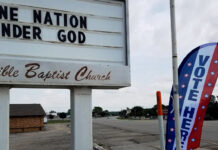For most of the last two-plus years, it appeared that Donald Trump’s continued presence on the political scene was the strongest evidence to date that Gerald Ford’s pardon of Richard Nixon had been a mistake. After all, that pardon ended any realistic chance of declaring once and for all that there are certain tactics and practices that are absolutely, positively unacceptable in our politics.
In hindsight, it is now clear that the pardon resulted in a coarsening of our rhetoric that ultimately made it possible for a man to stay in the race despite plastering a private cell phone number on social media, mocking the disabled, and condoning violence at his rallies, among other things. At worst, it may have made it possible for a presidential campaign’s operatives to think it was even remotely acceptable to collude with a hostile foreign power in order to help their man win.
Well, on Sunday night, NBC News revealed an anecdote that should remove any doubt that pardoning Nixon was a colossal blunder. It turns out that Watergate special prosecutors had evidence that several operatives in the Nixon White House planned a brutal assault on Vietnam War protesters in 1972.
NBC’s Ari Melber detonated this bombshell just as most of the East Coast was sitting down to Father’s Day dinner.
This is our exclusive report from #ThePoint:
New Watergate Memo Shows Evidence Nixon White House Plotted Violencehttps://t.co/pWxzGt3823 pic.twitter.com/eCX04TLYZP
— Ari Melber (@AriMelber) June 18, 2017
As part of NBC News’ plans for extensive coverage of the Watergate break-in’s 45th anniversary, Melber obtained an 18-page memo written in June 1975–about 10 months after Nixon resigned. The memo, written by special prosecutor Nick Akerman, revealed that “an extensive investigation” had revealed Nixon operatives, led by special counsel and “hatchet man” Chuck Colson, had planned a brutal surprise for those attending an antiwar rally at the Capitol in May 1972. The rally was timed to occur while recently deceased FBI Director J. Edgar Hoover was lying in state.
Specifically, the staffers had arranged for a number of “long-haired demonstrators” to be beaten up. In particular, the plotters wanted to single out Pentagon Papers whistleblower Daniel Ellsberg. However, Ellsberg managed to slip out of the net. On Sunday’s edition of MSNBC’s “The Point,” Akerman told Melber that the goons were “unable to reach him (Ellsberg) for some reason.”
As part of the investigation, Akerman interviewed longtime Republican provocateur Roger Stone, then a member of the Committee for the Re-Election of the President, or CREEP. At Colson’s behest, Stone helped recruit Washington-area Young Republicans for a counterdemonstration. However, Stone did not appear to know about the planned attack on the antiwar protest.
The investigation began when prosecutors got wind of reports in The Washington Post and other outlets that Bernard Barker, a member of Nixon’s “Plumbers” who had taken part in the Watergate burglary, and nine of his associates from the Miami area had “engaged antiwar demonstrators in a fight” at the Capitol. Indeed, the Akerman memo corroborates Ellsberg’s account of the incident in his 2001 memoirs, “Secrets: A Memoir of Vietnam and the Pentagon Papers.” Ellsberg claimed that “Cuban-American CIA ‘assets'” had flown to Washington with orders “to incapacitate (me) totally” at the rally.
This is outrageous. This is despicable. This is un-American. This is undemocratic. And all of those terms are being extremely kind to it.
Unfortunately, prosecutors’ efforts to get to the bottom of this gangsterish situation were muddled by Colson’s involvement in planning the counterdemonstration. Akerman concluded that any effort to pin criminal charges on Colson were “muddled by his efforts to organize a lawful counterdemonstration.” Ultimately, prosecutors concluded that the “melding of the counterdemonstration and the assault” would have made it difficult, if not impossible, to convict anyone beyond a reasonable doubt. Cliff Notes version: they knew that Colson and his cohorts were behind this gangsterish plot, but didn’t think they could prove it.
Now here’s where this story gets hideous. Akerman’s memo gives strong indications that Nixon was aware of the planned attack on Ellsberg and the demonstrators. Two of Nixon’s most senior staffers, Chief of Staff H. R. Haldeman and domestic adviser John Erlichman, feared that the story could “someday hurt the president” if links to Colson and others in the West Wing came to light. In an April 25, 1973 Oval Office conversation, Erlichman mentioned “bringing the Cubans up to rough up the demonstrators.” Nixon’s reply? “Campaign activities. I got that.”
So it’s clear that Nixon knew about this outrageous thuggery. But when did he know about it? Unfortunately, the pardon kiboshed any effort to get a definitive answer to that question. But it is clear at the very least that he fostered an environment in which such outrageously criminal activity could have even been concocted. And when he found out about it–at least as early as 1973, based on this memo–he did absolutely nothing.
Akerman says that this memo proves Watergate was “a much greater attack on our democracy” than most of us have been led to believe. Frankly, that’s an understatement. This memo spells out an attack on the most sacred trust in any self-respecting democracy–that your government will not willfully put its citizens in harm’s way.
The mere thought that such an outrageously criminal stunt could even be considered in the people’s house is, to put it in the most diplomatic terms that are possible, an outrage. It is equally outrageous that, at best, the president found out about it after the fact and did nothing.
(featured image courtesy National Archives and Records Administration, part of public domain)




